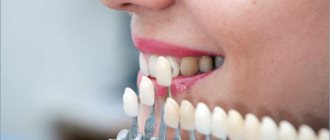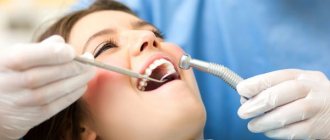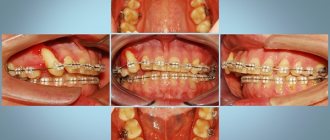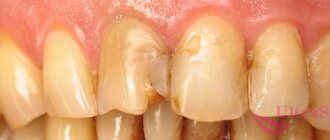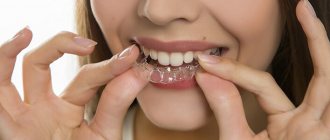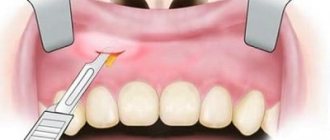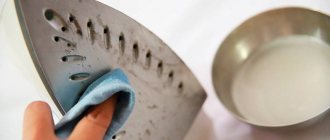Interestingly, there is such a phobia as fear of dental treatment. Over time, fear gained serious momentum and turned into a phobia. In turn, the phobia became a disease called dentophobia. The disease is relevant today, despite the fact that dental clinics have long been equipped with modern safe equipment, and doctors use only good painkillers in treatment. A third patient in the world continues to experience pathological fear of the dental office.
Signs of dental phobia
This disease should not be treated with laughter. A patient with dental phobia experiences not only fear of the dentist, but also panic anxiety, which can lead to severe aggression or loss of consciousness. He gets anxious just from the thought of the dental office. A person is ready to endure unbearable pain, suppress it with strong painkillers, and self-medicate. He will refuse to visit the doctor even under the pressure of terrible threats.
It is necessary to distinguish between ordinary fear and phobia. A person understands with fear that dental treatment is a necessity and that he needs to go to the doctor. The patient with a phobia completely denies this point.
If a dental phobe does get to the doctor, he will not be able to relax even a little in the dentist’s chair. Neither persuasion, nor a pleasant atmosphere, nor the politeness and adequacy of the doctor will help him. There were cases when the patient began to react inadequately to the most ordinary actions of the doctor. Completely safe dental procedures can lead to complete loss of consciousness.
The anxiety of a person with dental phobia defies logical explanation. He does not understand that simply refusing to visit the dentist will not make his teeth healthy. Untreated caries will develop into pulpitis, and then periodontitis will begin. And eventually, a slightly diseased tooth will have to be removed. In addition, diseased teeth are often the cause of heart disease and chronic diseases of the ENT organs. However, this information does not reach the understanding of the dental phobe.
Signs of the disease often do not appear immediately. Doctors identify several more signs of dental phobia:
- Panic anxiety.
- Severe muscle tension.
- Increased sweating.
- Headache.
- Refusing any contact with a doctor.
- The state before fainting or fainting itself.
- A disorder of the internal organs, which is accompanied by colic, vomiting, urination or diarrhea.
- Complete uncontrollability of movements and actions.
- Aggression with its physical manifestation.
- Pupil dilation.
How to stop being afraid of the dentist?
How not to be afraid of the dentist? This is the most important question for a person suffering from dental phobia. It becomes especially acute when it is no longer possible to delay a visit to the dentist.
Advice from a psychologist will tell you how not to be afraid of the dentist and overcome dental phobia forever.
- First of all, need to figure it out about what exactly you are afraid of. To do this, you can create a table that will help you determine the type of fear. In the first column you need to enter a possible version of the phobia, and opposite each item put a number from 1 to 4, where a four will correspond to the concept “I’m incredibly afraid,” a three will correspond to “I’m very afraid,” a two will mean “I have moderate fear,” and one will correspond to “not I'm completely afraid." For example:
Fear Option Fear level from 1 to 4 I'm afraid to remove a tooth 4 I'm afraid to drill my teeth 3 I'm afraid of an injection at the dentist 2 I'm afraid to remove the nerve from a tooth 2 I'm afraid of anesthesia 1 I'm afraid to pull out my wisdom teeth 4 I'm afraid to get a dental implant 2 I'm afraid to remove a tooth with a cyst 4 I'm afraid to remove tartar 1 I'm afraid to treat my front teeth 2 It is necessary to carry out such a test in a calm environment, honestly writing out all your fears.
- The second stage is analyze the resulting list and try to figure out what exactly scares you in each specific case and what could have caused this phenomenon.
For example:- I'm afraid to pull out a tooth because I'm afraid of the pain. I already had a tooth removed once without anesthesia, and it was very painful.
I am afraid to remove tartar because I am ashamed that my teeth are very neglected. Last time, the dentist lectured me for a long time and reproached me for not taking care of my health at all.
- I am afraid when my teeth are drilled because the sound of the drill working is unpleasant to me. As a child, my parents always scared me with her.
- a preliminary consultation dentist can help overcome fear of dentists . Most clinics provide their patients with the opportunity to communicate with a surgeon or therapist, at whose appointment existing dental problems are discussed and ways to eliminate them are discussed. You can ask the doctor all your questions, as well as ask for clarification regarding all diagnostic and therapeutic measures. Anesthesia issues are also discussed, as well as possible alternative therapeutic techniques. A trusting relationship with a doctor largely determines success in the fight against dental phobia. If the patient trusts the attending physician, then he will more quickly relax in the dental chair and cease to feel fear.
- Don't put off visiting the dental office. Over time, the fear may not become less, but the condition of the teeth will be much worse.
- Before seeing a doctor, try to get a good rest and sleep . The night before, you can take glycine or use folk remedies with a sedative effect (infusion of valerian or motherwort). Before visiting the dentist, do not plan any important events that could cause additional stress.
Often such a simple technique is enough to get rid of the fear of the dentist. If it is impossible to deal with the problem on your own, then you can visit the doctor with this list from whom you plan to undergo treatment and get advice regarding your fears and their reality.
Causes of dental phobia
The exact cause of dental phobia has not been determined to this day. However, there is a clear belief that fear arises against the background of ongoing changes in the central nervous system. And:
- Dentophobia appears against the background of dental trauma in childhood. Fear that was experienced in the past cannot let go of a person in the present.
- The disease seems to be inherited. Usually, if parents suffer from dental phobia, children in most cases inherit this fear from them. Emotional fear of the dentist becomes a family phobia.
- Dentophobia affects people who have always experienced attention deficit. They are usually withdrawn or, on the contrary, have increased hyperactivity.
- The disease causes stress experienced, which has acquired a chronic form or neurosis.
- Dentophobia becomes a consequence of the resurfacing of past painful manipulations in the memory.
- Stories from relatives, friends, and acquaintances about improper and unqualified treatment from dentists lead to illness.
- Fear arises against the background of a very high sensitivity threshold.
- A state of increased anxiety leads to fear of the dentist's action.
- Dentophobes suffer from frequent panic attacks.
- A person’s consciousness is influenced by the negative impact of social networks and the Internet in general, where terrible videos about dental treatment are often posted.
- A person is unable to tolerate the sight and smell of blood.
- Consequences of improper upbringing (in some families it is customary to scare children with the dentist).
- Dentophobes often suffer from a fear of any doctors, not just dentists.
- A person with bad teeth understands that he has already delayed treatment and will have to treat his entire mouth. Therefore, he is terribly afraid of this long and painful procedure.
- A dental phobe may experience a fear of contracting a foreign disease (HIV, hepatitis) through tools.
- He often experiences an absolute feeling of helplessness.
- A dentophobic person has no control over his emotional states.
- Any medical intervention causes fear.
- The presence of a disease such as vegetative-vascular dystonia.
- Fear of dental instruments, leading to gag reflex and choking anxiety.
Dentophobia in children
Dentophobia occurs much more often in children than in adults. This is explained by the lability of children's emotions and the lack of previous experience of visiting the dentist. This phobia manifests itself especially hard in children aged 2 to 5 years, since at this age children are not yet able to control their emotions and actions, they are poorly accessible to contact and cannot fully talk about their experiences and fears.
In most cases, dental phobia in children is caused by the first unsuccessful trip to the dentist.
Children's dental phobia has the same reasons as the adult version of fear:
- fear of the unknown;
- fear of pain;
- negative previous experience of visiting not only a dentist, but also a doctor of another specialization;
- misbehavior of parents.
How to rid a child of fear?
If a child is afraid of the dentist, then most likely the reason will be an unpleasant first interaction with a doctor of this specialty. It is the first visit to the dentist that will shape a little person’s future attitude towards dentistry.
Overcoming dental phobia will be facilitated by:
- Maximum contact between the doctor and the young patient . The level of fear in a child will be significantly reduced if, before treatment, you give him a short excursion, during which you can show him the office, tell him about the instruments, show pictures about his teeth and their treatment.
- The use of anesthesia in dental treatment.
- Use of modern silent therapeutic techniques . The absence of unpleasant sensations, the sound of a drill, and the short duration of procedures are the main enemies of children's fear.
- The use of multimedia devices , thanks to which a small patient can listen to pleasant music, an audio story, or watch a favorite cartoon and take his mind off the treatment procedure itself and the negative emotions associated with it.
- Correct behavior of parents . If mom or dad feel nervous and anxious in front of the dentist's office, then this feeling is passed on to the child, and he instinctively begins to be afraid. Sometimes the strengthening of a phobia can be facilitated by harmless at first glance phrases “don’t be afraid”, “it won’t hurt”, “it’s not scary”, which are pronounced with the aim of calming down and which can have the opposite effect. Before the dentist's office, parents' behavior should be natural, and it is better not to make a big deal out of the visit itself. This is necessary so that the child feels from childhood that taking care of the health of his teeth is a common thing.
Fortunately, most children quickly adapt and stop feeling afraid. With the correct behavior of the doctor and parents, for young girls and boys, treatment of baby teeth, and subsequently primary teeth, will be an interesting and exciting adventure.
Types of dentophobia
The disease is divided into the following types:
- Imaginary dental phobia.
- Acquired dental phobia.
People with the first type of disease have been terribly afraid of any medical procedures since childhood. The injections cause them to faint. Even such a not very painful procedure as drawing blood from a finger brings them into terrible horror. If such a person is to undergo more serious treatment, then he must be prepared for this in advance.
The second type of disease appears against the background of external causes. Often people begin to fear the dentist after terrible stories from friends. They understand that their mouth needs long and serious treatment. But the negative information they hear makes them afraid of the sound of a drill and a doctor in a white coat. Dentophobes often leave the dental clinic just before entering the office.
An acquired phobia always manifests itself as a result of personal experience. The patient remembers the pain, the unpleasant manipulations of the dentist, the sound of the drill, and anesthesia. He further recalls that the filling he placed fell out very quickly and he again had to go to the dentist’s office. Bottom line: fear is constantly reinforced by new factors and emotions.
Why am I afraid to go to the dentist or where do my fears come from?
The very first and most important point that allows you to overcome your fear of dentists is to understand the cause of such a problem. Each of those suffering from dental phobia has its own personality, but in general, the factors that provoke the phobia are quite similar.
- Extremely negative previous experience with dental treatment. Representatives of the older generation probably remember the “Soviet standards” of providing dental care: a roaring drill, minimal anesthesia (or even its absence), an unpleasant taste in the mouth after arsenic. At the same time, treatment of one tooth most often took place in several visits, which also did not give patients positive emotions. All this contributed to the development and strengthening of fear of the dentist, and subsequently to the formation of severe phobias.
- At the present stage, dentistry offers patients a huge number of new services, many of which have foreign and incomprehensible names (for example, Opalescence, White light or Zoom). It is this uncertainty that makes a person afraid to go to the dentist. Trying to find information on the Internet can often worsen the phobia due to negative reviews and comments from “experts” that frighten patients on dental resources.
- Many people are afraid to go to the dentist because of bad teeth . This fear is often fueled by some doctors who criticize the patient’s attitude towards his own health. The result is a vicious circle: the worse the condition of the teeth, the more pronounced the phobia becomes.
- Some women are afraid to go to a male dentist . This is due to the fact that representatives of the fair sex are embarrassed to look funny with their mouths wide open. In addition, a visit to the dentist's office implies restrictions on the use of decorative cosmetics, which also confuses some ladies.
- If a child is afraid to have his teeth treated, then in some cases the cause of this phenomenon should be sought in the behavior of the parents . Moms and dads (who sometimes suffer from dental phobia themselves) tell their children that if they misbehave, the doctor will pull or drill their teeth. This is done so that the child sits calmly in line in front of the dentist’s office. As a result, children begin to fear even the simplest and most harmless dental procedures. And neither a teenager nor an adult can overcome such fear, rooted in childhood.
In addition to the reasons listed above, dental phobia can be caused by mental illness or a low pain sensitivity threshold . Sometimes a similar problem occurs during pregnancy , when the expectant mother is afraid that the treatment may harm her baby.
Dentophobia: diagnosis and treatment
The disease is diagnosed during a routine conversation with a doctor. Some people describe their experiences colorfully, not at all embarrassed by this fear. They focus on the negative aspects of treatment and say what they experience inside.
How to help a person with dental phobia? A doctor can do this. Already at the first appointment, after diagnosis, the dentist tries to determine the correct approach to the patient. He understands that each case is individual and success in treatment largely depends on the degree of dental phobia.
Initially, the dentist tries to establish friendly contact with the patient. Then he begins to professionally, unobtrusively, and logically explain how the treatment will proceed. The doctor tries to describe all stages in great detail, focusing on the painlessness of the procedure. If the patient receives the information presented to him, he will be imbued with respect for the dentist and will be able to look at the treatment procedure in a completely different light.
The patient needs to know that his personal actions and attitude are just as important at this moment. He should try to meet the doctor halfway. Patients always focus on their feelings and fears. However, these points should in no way prevent them from listening to the doctor’s advice. In this case, a confidential conversation will lead to an understanding that it is impossible to prolong dental disease. It will only get worse. In addition, the complexity of treatment leads to a significant increase in the cost of the procedure.
The doctor always informs the patient that the treatment is carried out under anesthesia, which makes the process painless. The patient will only feel the action of the dentist’s hands. In addition, today you can make an anesthesia injection completely painless. For these purposes, a special anesthetic gel is applied to the patient’s gums before the injection. As a result, the person does not feel the needle and medicine being administered to him.
Currently, many dentists use innovative anesthesia called “The Wand”. The anesthetic is administered using a special computerized device that looks like a syringe. The person does not experience pain at all, all treatment is carried out quite easily. This point also needs to be conveyed to the patient.
Treatment methods
Dentophobia can be dealt with using the following methods:
- Psychotherapeutic method.
- Medication method.
Medication method
Drug treatment consists of using special antidepressant drugs. An interesting study was conducted at psychiatric institutes in Russia, the result of which showed that dental phobia is well treated with the help of serotonin-selective antidepressants. Such drugs, for example, include cipramil. The drug allows you to completely eliminate anxiety, due to the fact that the production and metabolism of serotonin in the head is normalized.
Long-term treatment with antidepressants is not addictive and is quite well tolerated by patients. A person begins to feel a weakening of fear after just three weeks of taking medication. For a sustainable effect, treatment will be required for at least three months.
Antidepressants are prescribed for severe phobias. In case of a mild form of the disease, it is enough to talk with the patient, give pain relief before the injection and administer modern painkillers.
For more persistent dental phobia, premedication is recommended. Its essence is to take sedatives in advance of the procedure. Such medications can be taken in various forms: tablets, injections or syrups. Premedication is permitted both several hours and several days before the intended treatment.
Psychotherapeutic method
The psychotherapeutic method helps to find out and eliminate the very causes of the disease. The main goal of treatment with a psychotherapist is to convey to the patient the information that his fear can be easily controlled, and ignoring dental treatment will certainly lead to more serious consequences.
Depending on the severity of dental phobia, treatment takes different times. The efficiency of the process is affected by the forces applied on both sides.
Psychologist's Arguments
- Every person in the world is obliged and must visit the dentist. How many people in the world have already done this and nothing terrible, much less fatal, has happened to them. No one has ever died from dental treatment.
- The psychologist advises using a special method called “anchoring.” A person must remember moments in life when he experienced a tremendous sense of courage, complete fearlessness, strong endurance and absolute calm. The dentophobe must anchor these feelings in his memory. While in the dental office, the patient should try to reproduce this anchored image in reality.
- Psychologists advise treatment under sedation. This is a special method that allows the patient to completely calm down and fall into a shallow sleep. Upon completion of treatment, the person does not remember any unpleasant sensations. He clearly understands that there is nothing wrong with dental treatment. Next time, the dentist will completely trust the doctors, knowing that the treatment process is painless.
- Dental treatment is improving every year. Science is moving in this direction by leaps and bounds. Recently, manufacturers have released modern equipment that allows for more productive and painless treatment. In addition, modern anesthetics make the process of being in the dentist’s chair completely painless.
- There is one more point that lies in the peculiarities of the human psyche. It has been proven that even the most intense pain is erased from memory after 3 hours. If you try to recall a serious painful sensation experienced in your memory, you will not be able to do this.
- A psychologist may recommend taking a loved one with you to the dentist. The presence of a soul mate nearby will facilitate the treatment process, having a calming effect on the person.
- If a patient is afraid of contracting AIDS, HIV or hepatitis, then he can be recommended to undergo a special program called “Anti-AIDS”. The patient must understand that medical institutions have strict requirements for sterility. In dentistry, they use only disposable instruments, which also includes drills.
Reasons for being afraid of the dentist
There are brave souls who fearlessly go to the dentist and rejoice in the fact that they will soon become even healthier, but there are very few of them. Most people dread going to the dentist. The reasons why patients are afraid to go to the dentist are common fears.
Fear #1. It will hurt me a lot!
Fear of pain is the most common and severe, and can arise for several reasons:
- Stories from relatives or friends about the pain they experienced during dental treatment. Stories from the distant past sound especially frightening, when there were no effective painkillers, and old drills inspired fear not only with their sound, but also with their appearance.
- Fear coming from childhood. Often parents choose the wrong tactics for hygienic education of children: by forcing children to brush their teeth, they scare them with toothache and doctors. In adulthood, the subconscious revives pictures from childhood, and fear appears.
- Personal negative experience of dental treatment. A person remembers all the painful procedures he had to endure at the dentist's office.
- Low threshold of pain sensitivity in the patient.
How to deal with this fear You need to understand that modern dentistry allows you to treat your teeth completely painlessly. There are two types of anesthesia:
- Local - the anesthetic relieves sensitivity only where medical intervention is planned. To administer anesthesia, carpule syringes are used, the needles of which are thinner than those of any other disposable syringes. This allows you to reduce pain during the injection. Modern anesthetics Ultracaine, Septanest, Mepivastezin, Ubistezin are several times superior in pain-relieving power to novocaine and lidocaine, which were used previously. If the patient is afraid of even minor pain, an anesthetic gel or spray with lidocaine is applied to the gum before inserting the needle.
- General is general anesthesia, it is performed using narcotic analgesics. They are administered by inhalation or intravenously, while the patient’s consciousness is turned off. General anesthesia is used when local anesthesia is ineffective, when there is a large volume of surgery, and for some medical reasons.
Sedation is also used - with the help of special drugs, the patient is put into a state of semi-sleep, but at the same time he can communicate with the doctor. The feeling of fear disappears, indifference to any manipulation appears, and mood improves. Sedation does not eliminate pain and is therefore combined with local anesthesia.
Modern equipment, which is equipped with an effective cooling system, also helps reduce pain. The use of ultrasound and laser systems in surgical dentistry facilitates complex operations.
Treatment of caries in the initial stages is possible without a drill with Icon technology: tissues affected by caries are softened with a special gel and removed; Icon liquid filling is applied on top.
Advice: Familiarize yourself with modern methods of pain relief and dental treatment, study information about clinics in your city.
When you decide to come for an appointment, tell the doctor about your fears. Agree with him on some kind of conditional sign that you will give if you suddenly feel unpleasant or hurt. The doctor will immediately stop the manipulations and take measures, for example, increasing the anesthesia.
Fear No. 2. I'm afraid of the doctor's judgment
Often, patients with bad teeth are afraid to go to an appointment only because they feel that the dentist will judge, shame them for their oral health, or express their disgust.
How to deal with this fear Think about how many different people the dentist has seen over the years of his work; it is unlikely that everyone’s dental condition was ideal.
Advice: look on the Internet for pictures of some dental diseases, for example, generalized caries. For a doctor, such things are everyday practice, and he certainly won’t be surprised by your teeth.
Fear #3. I'm afraid that the tooth will be removed. As long as it doesn’t hurt too much, I won’t go!
Many people, not understanding the specifics of treatment, believe that if a tooth starts to hurt, the doctor will remove it, so they avoid visiting the dentist’s office for as long as possible. Or they wait until the slight pain in the tooth goes away on its own.
How to deal with this fear It is important to understand here that teeth will never be restored without the help of a dentist. No competent specialist will remove a tooth that can be saved. But the longer a tooth is left untreated, the less likely it is to save it; the health of other organs is at risk. For example, if in the initial stages of caries you can only get by with a filling, then delaying treatment can lead to the development of pulpitis, then periodontitis, destruction of the jaw bone tissue will begin, and the infection will spread through the bloodstream to other organs (heart, kidneys).
If a tooth is lost, prosthetics will be needed to restore the chewing and aesthetic functions of the jaw, and this entails an increase in the cost of treatment. It is wiser to protect the natural health of your teeth.
Advice: Make an appointment with your doctor for a consultation without treatment. Discuss with your doctor the condition of your teeth, upcoming procedures and their cost. Ask your dentist what processes will occur in the diseased tooth if it is not treated; what complications does this threaten?
Fear No. 4: The doctor will make a mistake or infect me with something.
If you had a negative treatment experience in the past, an incorrect diagnosis was made and complications arose because of this, it is natural to fear that history will repeat itself.
Due to the prevalence of HIV and hepatitis viruses, cases of infection with these infections through dental instruments are widely known. Therefore, the fear of becoming infected during treatment is well founded.
How to deal with this fear The fear of medical error can be avoided by turning to a specialist who regularly treats good friends or relatives. Numerous positive reviews about the dentist will reassure you and give you confidence.
Some patients are frightened by the unknown: not knowing what the doctor is doing, they simply shrink in fear in the chair. An attentive dentist will explain his actions, which will relieve all the patient’s worries and fears.
For those who are afraid of contracting hepatitis or HIV infection, dental clinics offer the “AntiAIDS-Antihepatitis” program: it includes using a special method to ensure the sterility of all instruments and materials.
Advice: make an appointment with a doctor, talk to him, get acquainted with the equipment in his office and methods of work. Find out which clinic in your city takes part in the AntiAIDS-Antihepatitis program.
Treatment tips
In order to cope with a phobia, you need to listen to the following tips:
- Make special demands on your dentist. The most important thing here is to eliminate the stress that will be caused by the expectation of illiterate treatment and rude attitude. A good specialist will not only perform his work efficiently, but will also provide the patient with due attention.
- You must try to find contact with the dentist yourself. You need to explain to the doctor what you will tell him if you suddenly feel pain. The doctor will always respond to your reaction and stop the painful procedure. Of course, the patient will not feel pain, but knowing this moment will give the dental phobe more confidence. In addition, you can ask the doctor to talk about the progress of the treatment. The patient does not need to know what instrument the doctor is currently using or what medicine he is putting into the canal. However, information about the course of treatment itself will give the dentist a sense of control over the procedure and the patient will behave more calmly. After all, he understands that the treatment is moving towards the end.
- Pay attention to the room in which the treatment will take place. There should be no sobbing children and worried mothers around him. This will greatly spoil the mood of a dental phobe. It would be nice if the hospital resembled some kind of hotel, and did not depress the patient’s condition with its white walls and strong lighting.
- Be sure to insist on anesthesia. Minor caries can be treated without pain relief. However, the very fact of administering an analgesic will give confidence to a person with a fear of dental treatment. Local anesthesia will completely numb the part of the jaw where the diseased tooth is located. As a result, the person will not feel pain or feel the vibration of the drill.
- If the dental clinic provides sedation, then you should agree to it. During this procedure, the patient is put on a special mask through which oxygen and nitrogen are supplied. As a result, the treatment takes place under a feeling of complete relaxation; the dental phobe does not experience fear at all. At the same time, clarity of consciousness remains. There have been cases when patients simply forgot what happened to them during treatment.
- If you are satisfied with the doctor, try to continue to visit only him.
- If a dental phobia is afraid of the dentist's chair, then treatment should begin with a conversation on the couch. The doctor will definitely put you in the right mood.
- Always remember that dental treatment is a necessity. Postponing a visit to the dentist will lead to even more nerves, pain and financial costs.
Treatment of children
Young patients very often experience fear of the doors of the dental office. It is difficult to explain to them that now the treatment procedure does not cause pain. It is good that nowadays it has become much easier to gain a positive attitude in sick children. Children can participate in the treatment process itself. How, you ask? A child today can choose the shade of the filling. The filling palette contains seven interesting shades with shimmering shine. These are gold, white, blue, light green, orange and pink. Participation in the process will give the child confidence that he is deciding something. Thus, he quickly makes friends with the medical staff. Creative fillings will leave a child with pleasant memories and reduce fear of the dentist in the future.
How to overcome fear of the dentist - a view from the other side
Dentophobia is not only a problem for patients. This phenomenon also applies to doctors, who must decide what to do with a person who needs to undergo some kind of medical procedure (for example, remove a nerve or pull out a rotten tooth), but he is deathly afraid to sit in a dental chair.
A good surgeon, therapist or dental technician will first talk with the patient to find out the level of his fear, and will also listen to what specifically worries the person and what his phobias are associated with. He will explain in detail what this or that procedure is called and what its essence is.
In general, modern dentistry is aimed at maximizing stress reduction in people when visiting the dental office. For this they widely use:
- A background of light classical music or natural noises that promote relaxation and calm.
- Some clinics are equipped with video glasses, thanks to which the patient can be distracted by watching an interesting film while the dentist is working.
- In special cases, dental treatment under anesthesia is used.
Cases of severe dental phobia are corrected by a psychotherapist using various therapeutic techniques.
Dentophobia and myths
They used to say that people with dental phobia should not have dental implants. Knowing this information further increased the fear of dental phobes. They preferred to go without teeth, just to avoid going to the dentist. Today, scientists and dentists have proven that implantation of new artificial teeth is indicated for even the most difficult patients. Here you just need to competently prepare the dental phobe by conducting a psychological conversation with him. The patient will feel like a participant in the process, and not a pitiful hare in front of the teeth of a wolf. Since a person without nerves will survive the treatment, his recovery period will also be quite easy.
It has been proven that women are more afraid of dentists than men. Many people consider the drilling procedure and anesthetic injection to be the worst moment in dental treatment.
It’s good that today almost all dentists take special courses on working with overly emotional clients.
If dental phobia is not treated
Everyone understands that ignoring toothache and refusing to visit a doctor leads to very disastrous consequences.
On the health side, this is an intensification of the inflammatory process. Food chewed by diseased teeth becomes infected. Already unhealthy, it gets ingested, causing diseases of the digestive tract, disease of the endocrine glands, asthma, rheumatism and other problems. Also, ordinary caries develops into a more complex form. The result is pulpitis and periodontitis. Ultimately, the person loses the tooth. Also, treating a more complex disease requires more money.
From a psychological point of view, a person begins to experience aesthetic discomfort due to the appearance of his teeth. As a result, he begins to smile less and is embarrassed to communicate openly with people. The patient becomes closed, the people around him are less and less interested in him. Often such people begin to have problems at work and with others in general.
In conclusion, I would like to give one last piece of advice to a person with dental phobia: do not delay visiting the doctor. The main thing is to go. Talking to a specialist will help you overcome your fear. In the future, treatment will not cause so many terrible emotions.
Sources used:
- Dental caries: monograph. / G. Ovrutsky, V. Leontyev. - M.: Medicine, 1986.
- Can dental phobia be treated with anesthesia? How to get rid of the fear of the dentist // AiF
- The Phenomenon of Dental Fear - Studies in Clinical Diagnosis, Measurement and Treatment, Fællestrykeriet, Aarhus University; Aarhus Denmark
How to get rid of dental phobia?
For a long time, dental phobia was not perceived as a phenomenon worthy of attention. Parents forcibly dragged their crying and kicking children to doctors' offices, thereby making matters worse. Adults suffered no less: they either put off going to the dentist until the last minute, or went through serious pain and did not find understanding from others. This was especially true for men: a person with dental phobia can easily faint at an appointment. For many men, this is a strong blow to their pride. Fortunately, today dental phobia is taken much more seriously. A number of publications write about how to overcome fear of dentists, and experts conduct research to improve the effectiveness of various measures. There are a number of techniques that can help, if not get rid of dental phobia completely, then at least eliminate its most severe manifestations. Methods for correcting dental phobia are divided into medicinal and therapeutic.
- Drug treatment of dental phobia. The main drug for correcting severe forms of dental phobia is the antidepressant Tsipramil and other drugs similar in action and composition. Antidepressants help eliminate panic and anxiety and normalize the production of serotonin. Immediately before starting treatment, sedatives may be recommended, as well as natural remedies that have a calming effect.
- Therapeutic treatment. The psychotherapeutic method is based on analyzing the causes of dental phobia and overcoming fear by the patient himself. The main role here is played by a psychologist who seeks an individual approach to the patient and helps him cope with his problem. This allows you to look at the problem from the outside and prepare for a trip to the dentist.

